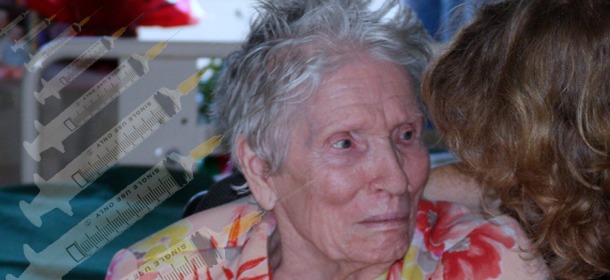Diseases/Conditions
CDC Claim of No Autism-Vaccine Link Based on Junk Science
The CDC has produced junk science that demonstrates absolutely nothing, but claims it shows no connection between autism and the vaccine schedule. It’s now spinning it as if it proves that there’s no link between the modern day nightmare of autism and the vaccines that they push for Big Pharma. Here’s the evidence.

Junk, by Daniel Y. Go, cropped and with word Science superimposed
by Heidi Stevenson
The CDC has produced a study, claiming that it proves that there’s no link between autism and the number or timing of vaccinations. The mainstream news has been covering it with its usual unquestioning cheerleader approach. Worse, they have—with the assistance of the Centers for Disease Control (CDC)—conflated the study with the more basic question of whether vaccinations cause autism. Of course, their implied conclusion is that it doesn’t, and that now parents should simply accept their claims that there’s no connection between vaccines and autism.
However, I have read the study—and frankly, it provides a new standard for the term pseudo science.. Even the little information that’s been produced by the media makes it absolutely clear that the study is nothing but junk science. In no sense does it even come close to demonstrating a lack of association between autism and vaccines. There are several reasons.
The primary flaw is that there is no comparison between vaccinated children and unvaccinated children.
That’s right. That alone is more than enough to simply toss the study in the trash. The only way to prove whether vaccines cause autism is by comparing vaccinated and unvaccinated children. That has never been done. Until then, there is simply no purpose served in examining how the relative levels of vaccination affect the condition:
Why would you want to investigate whether the degree of exposure affects a condition, unless you’ve already found that it actually causes it?
The fact is that no such legitimate study has been done. The CDC’s reason, the same one that’s parroted around the world, is that it would be unethical. They claim it would be unethical to deprive children of the questionable benefits of vaccination by doing such a study. There are, of course, two solid arguments countering that claim:
- The first is that such considerations have never stopped them from doing medical studies in any other arena. So why should it stop them now?
- The second is that there are large unvaccinated pools of children who could be compared with vaccinated ones. These include the Amish people, thousands of Homefirst clinic patients, and a large percentage of the Waldorf Schools children. There is no lack of unvaccinated children for such a study, either prospective or retrospective.
The Study
The study[1] was a case-controlled variety. It used 256 children defined as having autism spectrum disorder (ASD) and compared them with 752 children who hadn’t been given the diagnosis. Reports that give these numbers, though, do not tell the whole story.
Any child who also had a diagnosis for fragile X syndrome, tuberous sclerosis, Rett syndrome, congenital rubella syndrome, or Angelman syndrome was not included in the study. The stated reason was that they had “known links to ASD traits”. However, at least one of these conditions, Rett syndrome, is defined as a type of autism. It is not similar to autism. It is possibly the worst form of it. So, the authors of the study specifically eliminated the worst cases of autism from their trial!
They started with 771 potential ASD cases, not the 256 reported in the media, and 2,760 potential controls, not the 752 reported—and then they started eliminating subjects:
- 103 ASD cases (leaving 668 cases) and 316 controls (leaving 2,444 controls) were deemed ineligible. Why they were ineligible, we’re not told.
- Of the remaining subjects, only 321 ASD cases (48.1%) and 774 controls (31.7%) completed the trial. The reasons are not given. This is a significant factor. Notice that a far higher percentage of the ASD cases than controls completed the trial.
- Of the remaining controls:
- 12 of the remaining controls were eliminated because they had exclusionary conditions. (as described above)
- 10 controls were not included because they didn’t match any of the ASD cases.
- 186 controls were eliminated because they “had indications of speech delay or language delay, learning disability, attention deficit hyperactivity disorder or attention deficit disorder, or tics, or had an individual education plan”. In other words, any indication of a developmental disorder resulted in removal of a child from the controls group.
- 27% of the original controls were counted in the study.
- The remaining ASD cases were not eliminated for the same reasons that controls were. Instead, a different set of criteria was used:
- They defined a set of criteria based on testing to determine which children would remain in the study.
- They eliminated any child whose diagnosis happened after age 36 months.
- 33% of the original ASD cases were counted in the study.
Why the Results Are Meaningless
As initially pointed out, this study was done on the assumption that there is no connection between autism and vaccinations. Therefore, there was no reason to do such a study. Why would you do a study on whether there’s an association between autism and vaccinations before you believe that there’s been a study demonstrating such a connection? If this were legitimate science, then there’d be no reason to do it.
There is no explanation for the high dropout rate of subjects, nor is there an explanation for the significantly different dropout rates between ASD cases (51.9%) and controls (68.3%). More than half of both groups didn’t finish the study, yet we’re left without an explanation. Obviously, this large number could easily have changed the results.
The elimination of the worst type of autism, Rett syndrone, could easily have skewed the results.
Eliminating subjects from ASD cases and controls for different reasons is generally not legitimate in a case controlled study.
They looked at the number of antigens given to each child, both overall for their first two years and the number given on single days. This presumes that the number of antigens, rather than the number of vaccinations is the issue. It completely ignores adjuvants and other vaccine ingredients, including known toxins such as formaldehyde, mercury, and sorbitol 80, among others.
How the Authors Unintentionally Show the Absurdity of Their Study
Most interesting, though, is that the authors provide a very good reason to completely discount their approach to the question of whether vaccines are associated with autism. It’s in these words in the study:
The immunization schedule in effect during the years in which our study children were vaccinated included some, such as diphtheria, tetanus, and whole-cell pertussis, that
were cruder and more antigenic than current vaccines, and also caused more side effects. Removal of whole-cell pertussis vaccine from the childhood vaccination schedule has substantially decreased the antigenic load from vaccines.
The rate of autism has skyrocketed since the years covered by the study. The study looked at children born between 1 January 1994 and 31 December 1999—more than 13 years ago. They state that the antigens were “cruder and more antigenic than current vaccines, and also caused more side effects”. So, if antigens are so much gentler today, why would autism be increasing at such a great rate if antigens are the issue?
Clearly, the entire concept of using antigen burden to determine whether there’s an association between vaccines and autism is pointless. We have only to read what the authors themselves stated to know that.
Other Factors that Tend to Discredit This Study
At the end, the authors give thanks to Dr. Paul Offit for “his assistance in determining the antibody stimulating protein and polysaccharide content of specific vaccines”. Anyone familiar with Offit knows that he’s arguably the most significant vaccination promoter in the world. His infamous statement that it’s safe to give a ten thousand vaccinations to a single child clarifies that the authors entered this study with a strong bias in favor of vaccines.
The CDC produced the study. This is the US agency responsible for determining the vaccination schedule for children and adults. They have repeatedly denied any connection between vaccines and autism, in spite of an utter lack of any legitimate study demonstrating their claim. Therefore, they have a strong motivation to produce something that gives the impression that there’s no connection.
This study, even if well done, would be meaningless simply because it jumps the gun. It makes no sense to do a study on the relative degree of a potential toxin’s effect on autism when no study has yet been done to determine that there is one. Since no such study has been done that officially implicates vaccines as the cause of autism, as explained earlier, what’s the point in doing a study focused on the relative degree of harm? This is pure duplicity on the part of the CDC.
Conflating This Study with Whether Vaccines Cause Autism
What has happened in the mainstream media as a result of this study was predictable. Here are some quotes:
A large new government study should reassure parents who are afraid that kids are getting autism because they receive too many vaccines too early in life. (National Public Radio)[3]
Myths about autism and vaccines have persisted, in spite of the scientific evidence, partly because researchers don’t really know what causes autism, Dawson [Chief Science Officer of Autism Speaks] says. “Until we conduct the research to answer the questions about autism’s causes and risk factors, parents will continue to have questions,” she says. (USA Today)[4]
It’s obvious that the non-results of this study are being conflated with the issue of whether vaccines cause autism. That’s not the least surprising, since the Journal of Pediatrics, which published it, starts its own article introducing the study by doing it themselves:
Although scientific evidence suggests that vaccines do not cause autism, approximately one-third of parents continue to express concern that they do; nearly 1 in 10 parents refuse or delay vaccinations because they believe it is safer than following the Centers for Disease Control and Prevention’s (CDC) schedule (http://www.cdc.gov/vaccines/parents/downloads/parent-ver-sch-0-6yrs.pdf). A primary concern is the number of vaccines administered, both on a single day and cumulatively over the first 2 years of life. In a new study scheduled for publication in The Journal of Pediatrics, researchers concluded that there is no association between receiving “too many vaccines too soon” and autism.[5]
This statement clearly confuses the issue of whether autism is caused by vaccines and the results of this study. Can there be any doubt that the study’s purpose was to do precisely that, to confuse the issue?
Overall, the study and the way it’s promoted tell a story very different from the one intended. How can there be any doubt that the CDC has determined that it will do whatever is necessary to convince the public to subject their children to vaccines, even to the point of producing junk science that demonstrates absolutely nothing and then spinning it as if it proves that there’s no link between the modern day nightmare of autism and the vaccines that they push for Big Pharma?
Sources:
- Increasing Exposure to Antibody-Stimulating Proteins and Polysaccharides in Vaccines Is Not Associated with Risk of Autism; Journal of Pediatrics; Frank DeStefano, MD, MPH, Cristofer S. Price, ScM, and Eric S. Weintraub, MPH1
- Autism Risk Is Not Increased by Childhood Vaccines: Study; Pharmalot; Ed Silverman
- Number of Early Childhood Vaccines Not Linked to Autism; NPR; Jon Hamilton
- Full vaccine schedule safe for kids, no link to autism, USA Today
- The Risk of Autism Is Not Increased by “Too Many Vaccines Too Soon”
Tagged autism, autism vaccines, big pharma, cdc autism, cdc junk science, cdc pseudo science, centers for disease control autism, centers for disease control vaccines, conventional medicine, Increasing Exposure to Antibody-Stimulating Proteins and Polysaccharides in Vaccines Is Not Associated with Risk of Autism, journal of pediatrics autism, journal of pediatrics vaccination, journal of pediatrics vaccination schedule, junk science, modern medicine, politics, pseudo-science, vaccinated unvaccinated children, vaccination autism, vaccination schedule, vaccine, vaccine autism, vaccines














Pingback: CDC: “Allah sizi inandırsın aşılarla otizm arasında ilişki yok, olsa söylemez miyiz?!” | lilliputian.me
Pingback: Science-Based Medicine » The final nail in the coffin for the antivaccine rallying cry “Too many too soon”?
Pingback: Top Articles Debunking the CDC’s New Study About #Vaccines & #Autism
Pingback: CDC Autism and Vaccines Study Flu Vaccination Tedd Koren DC
Pingback: Autism's False ScientistsGaia Health